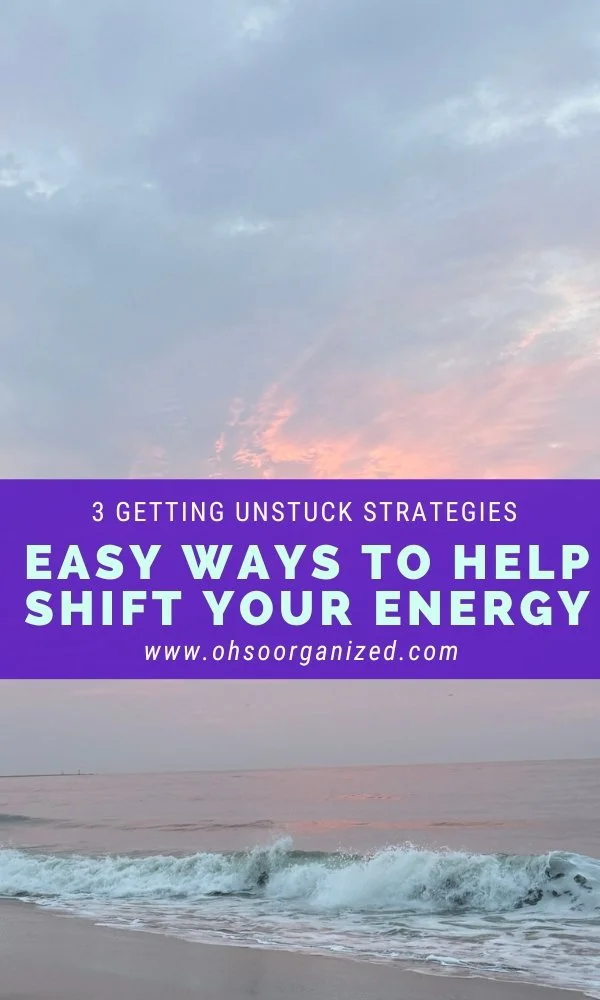It’s no fun to feel stuck, stressed, or overwhelmed. Remaining that way for a long time isn’t good for your mental health or well-being. Take a moment to check in with yourself and see how you’re feeling. Do you need help making a change right now?
The good news is that you can make minor adjustments. These tiny shifts can have positive influences on your energy and overall well-being. I’ve often written about ways to calm and ground yourself.
For me, activities like walking in nature, journaling, eating nutritious foods, and getting enough sleep are my go-to methods for boosting energy and improving my mood. They also reduce stress and overwhelm and help you get unstuck.
Recently, I discovered several new energy-changing strategies to help reduce morning stress, create momentum, and embrace relaxation.
3 Easy Ways to Help Shift Your Energy and Get Unstuck
1. Help Reduce Morning Stress
“Just give your brain 10 minutes to wake up.”
In a recent issue of Real Simple, Jay Shetty, author and On Purpose podcast host, advises against checking your phone first thing. Allowing your brain a few minutes to wake up without that distraction will have a positive effect on your entire day.
Jay says, “You would never wake up and let 100 people into your bedroom before you showered or brushed your teeth. But when you look at your phone first thing in the morning, you’re letting 100 people into your mind. Then you end up chasing dopamine the rest of the day. Just give your brain 10 minutes to wake up. If you do that, your whole day will be different and you’ll have less anxiety. Try it for seven days, and you will feel so much better.”
I’ve been working on this. One challenge I face is that I meditate first thing in the morning using an app on my phone. My goal is to meditate with the app before checking email, texts, or social media. I notice a clear difference in my practice when I meditate first. However, when I get distracted by other inputs, it’s harder to settle into my meditation.
As I consider Jay’s strategy to “just give your brain 10 minutes to wake up,” I’m reaffirming my commitment to my morning routine. I will meditate first before doing any other phone-related activities.
2. Help Create Momentum
“Clear enough space for momentum to arrive.”
In one of Oliver Burkeman’s newsletters, The Imperfectionist, he wrote, “If you’re stuck in a rut, and you feel like you’ve stopped making progress on things that matter, it could be that you need more immediacy in your life.”
He discussed ways to build momentum through concrete actions, like recycling the “300 articles I’d saved to read later.” How many things have you saved for someday—things to do, read, or take care of? Those piles of unfinished projects, unread books, clothes you’ll never wear, or gadgets you’ll never use occupy valuable physical and mental space in our homes and minds.
To get unstuck, create momentum, and spark creativity, do some “stuff” clearing. Oliver said, “It was as if I’d been assuming that what I needed was to collect sufficient resources to create momentum, when what I really needed was to clear enough space for momentum to arrive.”
What can you release, recycle, or donate today?
3. Help Embrace Relaxation
“Rushing tends to trigger the stress response, and slowing down helps switch it off.”
In a recent Real Simple article about how to relax and unwind, especially at the start of your vacation, Nicola Jane Hobbs, a psychologist and author of The Relaxed Woman, offers excellent advice. She understands how difficult it can be to switch from the stress and fast pace of your work life to taking time off and relaxing. I don’t know about you, but when I’m on vacation, it usually takes me a day or two to transition from go-go-going to just being.
One of Nicola’s strategies is simple and can be helpful beyond just vacations. She explains that slowing down even the smallest parts of your daily routine can act as a reset. “Rushing tends to trigger the stress response, and slowing down helps switch it off.” Slowing down your “daily actions” will “help your mind and body relax.”
Some ways to slow down (as in doing these things more slowly) include:
Walking
Chewing
Drinking
Breathing
Stretching
Washing your hands
Brushing your teeth
Next time you feel stressed or overwhelmed, try slowing down a small action and watch how it changes your experience.
What Helps You Get Unstuck?
There are so many ways to get unstuck, reduce overwhelm, or shift your mood. What are some of your go-to strategies? Which strategy that I shared resonates with you the most?
I’d love to hear your thoughts. I invite you to join the conversation.
How Can I Help?
Do you feel overwhelmed, stuck, or disorganized? I’m here to help! Virtual organizing is an extraordinary path forward – Local feel with a global reach.
Let’s talk. I’m easy to reach.
Schedule a Discovery Call
Fill out the Contact form
Email me at linda@ohsorganized.com or
Call 914-271-5673
Getting organized is possible, especially with support.














